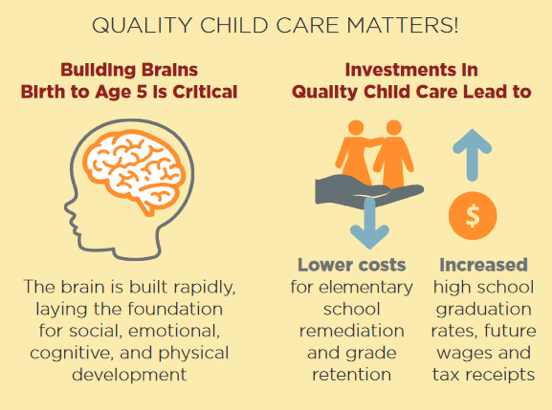The General Assembly is looking at teacher education and training in the early childhood and public education arenas. When we think about the early years and elementary education, they are so importantly linked. For many young children in North Carolina, child care (center-based, family child care home, Head Start/Early Head Start) is their early learning program. It’s a place where they spend most of their waking hours. It’s the place where child care teachers support their learning and healthy child development.

Why has North Carolina focused on the education of the child care workforce for decades? Because research shows brain development in the earliest years lays the foundation for all future learning. It’s the foundation for social, emotional, cognitive and physical development.[i] This foundation doesn’t happen automatically. It happens through teachers with early childhood competencies who support each child where he or she is at – to essentially help children build that foundation that is essential to school readiness and success.
Just a few weeks ago, the North Carolina General Assembly passed and the Governor signed into law SB387, the Excellent Public Schools Act of 2021. SB387 was approved in the House by a vote of 113-5 and in the Senate by a vote of 48-0.[ii] The point of this bill was to promote school readiness among young children by improving evidence-based reading instruction practices, including the acquisition of language, phonological and phonemic awareness, vocabulary, oral language and other skills that support the ability to learn to read. The new law establishes the Early Literacy Program within the Department of Public Instruction. NC Pre-K programs will need to adopt best practices in literacy-building skills.
Learning to read doesn’t start at age 4, or 5, or 6 or 7. Learning to read is connected to a child’s early brain development – the wiring that is so important for future development. It’s the early years when a child learns to talk, builds vocabulary and begins to make connections between sounds and the letters associated with those sounds. This doesn’t happen in pre-K and it doesn’t happen in kindergarten. It’s a growth process, and studies show by 18 months old, there’s a gap in language development between low-income children and their peers from wealthier families.[iii] By age 3, the gap involves millions of words.[iv] All of this is connected to later reading success. If the legislature wants children reading at grade level by 3rd Grade, then it makes no sense to undermine children’s learning in the earliest years as the brain is developing and language acquisition skills are forming that base of knowledge relied upon later.
There is a direct relationship between the education of the early childhood workforce and the ability to support and promote healthy child development, which includes all of the building blocks for later learning-to-read readiness. N.C. children need teachers with early childhood education to help them learn. Just say no to SB570.
[i] Harvard University, Center on the Developing Child, Brain Architecture.
[ii] https://www.ncleg.gov/BillLookUp/2021/S387
[iii] Developmental Science, Fernald, Marchman, and Weisleder, SES differences in language processing skill and vocabulary are evident at 18 months, 2012.
[iv] Hart and Risley, The Early Catastrophe, The 30 Million Word Gap by Age, 2003.



